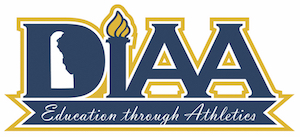Parents
Parent Resources for Student-Athlete Compliance
Your trusted resources for understanding transfer procedures, Senate Bill 281 guidelines, and student-athlete eligibility for Name, Image, and Likeness (NIL). Access essential forms, regulations, and FAQs to support your student-athlete’s compliance with DIAA policies.
DIAA Transfer Tracking and Senate Bill 281 Resources
DIAA Student-Athlete Eligibility and NIL Resources
The Role of Parents in Sports
A free course offered by the NFHS, “Positive Parenting within School Programs” provides information and resources to help educate parents about the importance of proper behavior in school sports and the role they must play to ensure their child has a positive sports experience. The course emphasizes that as a parent of a student who participates in athletics, they make a huge difference in the quality of their child’s sports experience, as well as what is being taught and learned by their child.
This course is free, but you will need to register an account with NFHS to view it.
The NFHS offers additional free courses that may be of interest to parents.
The Parent Seat
As a parent, there are many feelings and emotions that you will experience during your student’s participation in interscholastic activities. For students who are motivated to be a part of a team, it can be an enjoyable and rewarding experience for everyone. Sitting in The Parent Seat requires thought and discipline. It is not an easy seat!
Watch the “Parent Seat” video at NFHS.
- Understand the benefits that participation in interscholastic activities provides your student.
- Embrace the growth and development of your student. Taking a “hands-off” approach can allow the student to gain confidence and independence.
- Visualize yourself as a respectful spectator and emphasize to your student they should enjoy the experience, and above all, have fun.
- Consider exercising before the event. A short walk, deep breathing, or a few stretching exercises may be helpful to relieve stress.
- Participate in a relaxing activity, such as reading a book or listening to music before an event or other event may help provide a positive state of mind.
- Take a break. If your emotions begin to escalate while in the stands, a brief “timeout” may help you reset your emotions.
- The 24-hour rule. If you ever feel compelled to confront a coach, take 24 hours to collect your thoughts and allow your emotions to settle.
- Be responsible. You are a role model and it is important to understand that not only is your child watching you, but so are other participating students.
- Support your student. Tell them that you love watching them participate or how proud you are of the sacrifices they make to be part of a team.
Beyond the Scoreboard
Winning is fun. Winning is rewarding. Winning is an important goal. But the benefits of participation in interscholastic athletics and activities are bigger than wins – they go far Beyond the Scoreboard. Most of the enriching and experiences that you and your child will gain will go far beyond one contest, one season, or one championship.
Watch the “Beyond the Scoreboard” video at NFHS.
- Responsibility. Being a part of a team requires students to be accountable by upholding academic performance, punctuatlity, team dynamics and much more.
- Work Ethic. Learning the value of exceptional effort is meaningful, as time well spent pays dividends throughout one’s life.
- Cooperation. Students learn to get along and compromise, especially in challenging situations. Understanding team goals is a cornerstone to success.
- Integrity. Playing by the spirit of the rules and understanding the difference between right and wrong will have a lasting effect on building trust with others.
- Adaptability. As a member of a team, your child may be exposed to a variety of unexpected changes, such as injury or a coach’s unexpected decision.
- Competitive spirit. As your child goes through a season or a school year, the desire to improve and win can be a driving force in the success your student attains.
- Respect. Showing proper concern towards others, is a core value of the principles of sportsmanship, and carries over into life outside of competition.
- Self-control. The ability to retain emotional balance during the course of a competition or in practice is an important piece in your child’s development.
- Confidence. A true belief in oneself comes through the experience of having a good work ethic, being prepared, and knowing that you gave your best effort.
- Fitness. Participation allows your student to become involved in a routine that improves their physical, mental, emotional and nutritional fitness.




